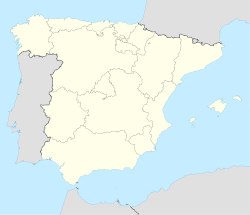Vilalba
Lua error in package.lua at line 80: module 'strict' not found.
| Vilalba | |||
|---|---|---|---|
| Municipality | |||
|
|||
| Location in Spain | |||
| Location in Galicia | |||
| Coordinates: Lua error in package.lua at line 80: module 'strict' not found. | |||
| Country | |||
| Autonomous Community | |||
| Province | Lugo | ||
| Comarca | Terra Chá | ||
| Government | |||
| • Mayor | Gerardo Criado Guizán (PPdeG) | ||
| Area | |||
| • Total | 379 km2 (146 sq mi) | ||
| Elevation(AMSL) | 480 m (1,570 ft) | ||
| Population (2012) | |||
| • Total | 15,116 | ||
| • Density | 40/km2 (100/sq mi) | ||
| Time zone | CET (UTC+1) | ||
| • Summer (DST) | CEST (GMT +2) (UTC+2) | ||
| Area code(s) | +34 (Spain) + 982 (Lugo) | ||
| Website | vilalba.org | ||
Vilalba is a municipality in Galicia (Spain), in the province of Lugo.
Contents
Pilgrim route
Vilalba is located on the old pilgrim route from western Europe to Santiago de Compostella, which enters from Burgos and Abadin to the east and crosses using the old Bridge of Martiñán in the parish of Goiriz, leaving on the west side of the town towards Baamonde, Guitiriz and León.
Journalistic tradition
Vilalba had during the 20th century a rich journalistic tradition that began in 1902 with the Ideal Villalbés, a newspaper handwritten by the poet and journalist Antonio García Hermida. This first episode will be continued, in a more professional form, by the El Eco de Villalba (1908) under the hand of Manuel Mato Vizoso and Novo Freire. After this they will come: El Ratón (1910), El Vigía Villalbés (1913), Azul y Blanco (1914), Villalba y su comarca (1915), Galicia pintoresca (1916) or El Heraldo de Villalba (1916) which will consecrate García Hermida's as a professional journalist.
But the proliferation of written press does not end there, but it will continue in the same year and the following ones with the first newspaper written entirely in Galician in the town, A Xustiza (1918), and in a little time: Aurora (1918), El Gato (1919), La Voz Villalbesa (1921), El Progreso Villalbés (1922) founded by Enríquez Chanot, El Villalbés (1925), El Villalbés de Buenos Aires (1927) or La Unión Ciudadana (1929). In the years of the II Republic was edited a politically active newspaper, the Faro Villalbés (1932). One of their more significant columnists was Carmiña Prieto Rouco, author of the "Himno da Terra Cha".
In the years of the dictatorship only two newspapers saw the light, both of them dealt mainly with sports: Stadium (1949) and El Castillo (1950). It will be necessary to wait until 1983 for a new newspaper with a wider repercussion, albeit short-lived: A Voz de Vilalba.
The tree
The town is unusual in having given its name to a local tree, the Pravia, which is a white maple located near the town's Parador (a fortress converted into an hotel).
Usually the Pravia turns to a stage to celebrate Christmas and represent the traditional Belen.
Notable Galicians born in Vilalba
- Ramón Chao, journalist, writer, and father of singer Manu Chao
- Manuel Fraga Iribarne, Minister during Francisco Franco's fascist dictatorship and President of the Galician Parliament between (1990-2005) by the Galician People's Party
- Antonio María Rouco Varela, prelate of the Roman Catholic Church
Gallery
See also
- The Andrade Family, Counts of Andrade and Pontedeume, and Lords of Ferrol, Serantes and Vilar.
External links
Lua error in package.lua at line 80: module 'strict' not found.



